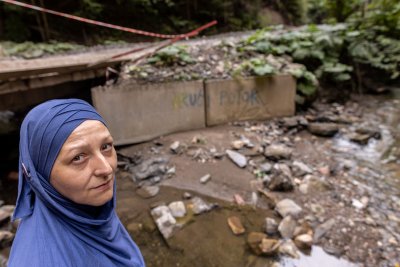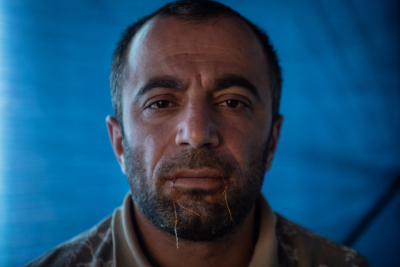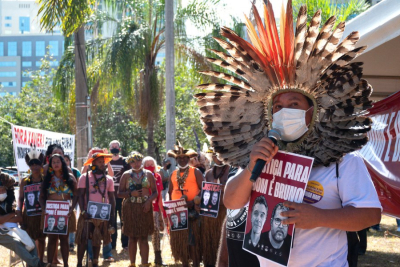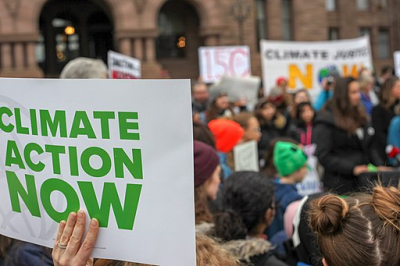What led to the lawsuit
Hajrija Čobo, an environmental activist and member of the informal group Park Prirode Trstionica i Boriva, has been advocating the protection of forests and watercourses in the Kakanj region since May 2022. She opposed the Adriatic Metals mining project and exposed illegal activities of the company.
After Čobo reported the company’s illegal construction of a concrete plant in the Mehorić area, inspectors confirmed the breaches, issued a fine to the subcontractor Trgošped d.o.o., and ordered the structure to be torn down. The demolition happened soon after, and although Adriatic Metals’ management pledged to repair the site, no real rehabilitation followed. Instead of restoration, the contractor kept clearing trees and removing earth to carve out a route for truck access to the mine. The removed material was dumped along the banks of the Boriva and Trstionica rivers, restricting the riverbeds and contaminating the water.
According to Čobo, in July 2022, shortly after she spoke out during a public hearing organised by the mining company, representatives from Adriatic Metals’ sustainability team approached her. They suggested providing financial support for any environmental initiative she or her organisation might propose – an offer she interpreted as an effort to silence her criticism. Nevertheless, Čobo and the Park prirode Trstionica i Boriva group continued drawing public and official attention to deforestation, pollution, and the destruction of local ecosystems. They filed formal complaints, shared videos and reports on social media, and held protests to highlight what was happening.
From June 2022, after she exposed the illegal construction, Čobo received threats through social media, phone messages, and personal encounters warning her to stop speaking out. Police intervention in March 2023 temporarily stopped the harassment.
The Defamation Lawsuit
On 4 October 2023, Adriatic Metals sent Čobo a formal request to publish a denial under the Law on Protection against Defamation of the Federation of Bosnia and Herzegovina, claiming her public statements about water contamination and community health risks were false. Čobo rejected the accusation and reiterated that residents of Kakanj were already experiencing the consequences of water contamination.
Two months later, on 12 December 2023, the company filed a defamation lawsuit for allegedly spreading false information about the company in the media and on Čobo’s social media. The lawsuit sought BAM 2,000 (EUR 1,000) in compensation for reputational damage.
On 11 January 2024, Hajrija Čobo submitted her defence to the court. In her rejoinder, she argued that the Vareš mining project by Adriatic Metals, enabled by unlawful government measures and by the exclusion of the affected communities, would cause severe environmental and social harm. She claimed that mining operations had been approved within legally protected water zones, resulting in deforestation, riverbed alteration, and pollution risks to the Bukovica and Borovički streams – key sources of drinking water for approximately 40,000 residents of the Kakanj municipality.
Čobo maintained that the permit process had violated environmental and property laws and relied on manipulated hydrological data that understated the risks to local water systems. Public participation had been hindered: residents had not been properly informed or consulted, and the only environmental hearing had been held during the COVID-19 lockdown in a settlement within the Vareš municipality, limiting access for most of the communities that were affected. She contended that the project exemplified systemic corruption and disregard for community rights, transforming a biodiverse, water-rich mountain region into a mining zone without the consent of those most affected.
Withdrawal and dismissal of the lawsuit
On 26 April 2024, Adriatic Metals notified the Kakanj Municipal Court that it was retracting its lawsuit against Hajrija Čobo. The company referenced Article 59 of the Law on Civil Procedure, which allows a case to be withdrawn before the main hearing, provided the defendant agrees. Čobo, however, refused to give her consent and asked the court to continue with the case and issue a ruling under Article 181(2). Speaking to Front Line Defenders, she explained that she would not accept a simple withdrawal: “Withdrawal means they can reactivate it any time and aim to silence me forever... I am doing this to ensure freedom of speech for everyone, not just myself.”
A preliminary hearing had been scheduled for 25 June 2024. However, on 17 June, the Municipal Court dismissed the defamation case without waiting for that session. The judge relied on a waiver submitted by Adriatic Metals BH d.o.o. on 3 June 2024 and applied Article 181, paragraphs (1) and (2), which allow a court to rule on the basis of a plaintiff’s waiver when the claim is abandoned before the hearing, even without the defendant’s approval.
The case of Hajrija Čobo illustrates the use of SLAPP lawsuits to intimidate environmental defenders and restrict public debate. Her persecution violated rights protected by the Aarhus Convention, as well as the right to freedom of expression. Although the case was dismissed, it shows how corporate legal pressure can silence civic voices defending the environment.
Sources:
EN; https://www.business-humanrights.org/en/latest-news/hajrija-%C4%8Dobo-park-prirode-trstionica-i-boriva/
EN; https://www.frontlinedefenders.org/en/case/court-rules-favour-hajrija-cobo-defamation-lawsuit





